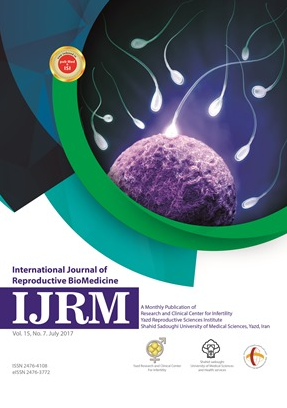
International Journal of Reproductive BioMedicine
ISSN: 2476-3772
The latest discoveries in all areas of reproduction and reproductive technology.
Cytotoxic activity of peripheral blood mononuclear cells in patients with endometriosis: A cross-sectional study
Published date: Sep 06 2022
Journal Title: International Journal of Reproductive BioMedicine
Issue title: International Journal of Reproductive BioMedicine (IJRM): Volume 20, Issue No. 8
Pages: 691–700
Authors:
Abstract:
Background: Endometriosis is believed to be associated with dysfunction of the lymphocyte population and cytotoxicity of natural killer (NK) cells, induced by the production of interleukin-2 (IL-2).
Objective: This study aimed to investigate T lymphocytes and NK cell activity in the peripheral blood mononuclear cells (PBMCs) of women with endometriosis.
Materials and Methods: PBMCs were obtained from the peripheral venous blood samples of 14 women with and without endometriosis (n = 7 for each group). Then, the PBMCs were co-cultured for 4 days and were treated with recombinant IL-2 for cytotoxic activity toward target cells (Daudi and K562 cells). The cytotoxicity activity was determined using the 51 chromium release assay before and after stimulation. Flow cytometry measurement was used to examine the expression of T lymphocytes and NK cells before and after being treated with IL-2.
Results: The concentration of CD3+CD28+ (co-stimulatory) was significantly lower in the endometriosis group (65.62 ± 5.38) compared to in its counterpart (50.24 ± 4.22) (p = 0.04) before stimulation. However, no significant differences were observed in any other T lymphocytes and NK cells. It was also found that there was a significant increase of CD3-CD28+ after treatment with IL-2 only in the healthy control but not in women with endometriosis.
Conclusion: Increased expression of CD160 and decreased CD28 play a role in inhibiting NK cell activation and T cell response in women with endometriosis.
Key words: CD28, CD160, Cytotoxic, Endometriosis, PBMC.
References:
[1] Reid Sh, Condous G. Update on the ultrasound diagnosis of deep pelvic endometriosis. Eur J Obstet Gynecol Reprod Biol 2017; 209: 50–54.
[2] Kvaskoff M, Mu F, Terry KL, Harris HR, Poole EM, Farland L, et al. Endometriosis: A high-risk population for major chronic diseases ? Hum Reprod Update 2015; 21: 500– 516.
[3] Yamamoto A, Johnstone EB, Bloom MS, Huddleston HG, Fujimoto VY. A higher prevalence of endometriosis among Asian women does not contribute to poorer IVF outcomes. J Assist Reprod Genet 2017; 34: 765–774.
[4] Eisenberg VH, Weil C, Chodick G, Shalev V. Epidemiology of endometriosis: A large population-based database study in 2-million-member health care provider. BJOG 2018; 125: 55–62.
[5] Zheng Q, Mao H, Xu Y, Zhao J, Wei X. Can postoperative GnRH agonist treatment prevent endometriosis recurrence? A meta-analysis. Arch Gynecol Obstet 2016; 294: 201–207.
[6] Králíčková M, Fiala L, Losan P, Tomes P, Vetvicka V, Králíčková M, et al. Altered immunity in endometriosis: What came first? Immunol Invest 2018; 47: 569–582.
[7] Shimasaki N, Jain A, Campana D. NK cells for cancer immunotherapy. Nat Rev Drug Discov 2020; 19: 200– 218.
[8] Stojanovic A, Fiegler N, Cerwenka A. CTLA-4 is expressed by activated mouse NK cells and inhibits NK cell IFN- γ production in response to mature dendritic cells. J Immunol 2020; 192: 4184–4191.
[9] Symons LK, Miller JE, Kay VR, Marks RM, Liblik K, Koti. M, et al. The immunopathophysiology of endometriosis. Trends Mol Med 2018; 24: 748–762.
[10] Riccio LGC, Santulli P, Marcellin L, Abrão MS, Batteux F, Chapron C. Immunology of endometriosis. Best Pract Res Clin Obstet Gynaecol 2018; 50: 39–49.
[11] Hornstein MD, Gleason RE, Orav J, Haas ST, Friedman AJ, Rein MS, et al. The reproducibility of the revised American Fertility Society classification of endometriosis. Fertil Steril 1993; 59: 1015–1021.
[12] van de Wetering D, de Paus RA, van Dissel JT, van de Vosse E. IL-23 modulates CD56+/CD3- NK cell and CD56+/CD3+ NK-like T cell function differentially from IL-12. Int Immunol 2008; 21: 145–153.
[13] Nikolova M, Marie-cardine A, Boumsell L, Bensussan A, Sarrail Â. BY55/CD160 acts as a co-receptor in TCR signal transduction of a human circulating cytotoxic effector T lymphocyte subset lacking CD28 expression. Int Immunol 2002; 14: 445–451.
[14] Frauwirth KA, Riley JL, Harris MH, Parry RV, Rathmell JC, Plas DR, et al. The CD28 signaling pathway regulates glucose metabolism. Immunity 2002; 16: 769–777.
[15] Tariverdian N, Siedentopf F, Rücke M, Blois SM, Klapp BF, Kentenich H, et al. Intraperitoneal immune cell status in infertile women with and without endometriosis. J Reprod Immunol 2009; 80: 80–90.
[16] Natadisastra M, Bustami AA, Mansur IG, Jacoeb TZ, Giustiniani J. Lymphokine activated killer cells from peripheral blood mononuclear cells of endometriosis of patients improve cytotoxicity to endometriosis cell culture. Med J Indones 2011; 20: 87–93.
[17] Fons P, Chabot S, Cartwright JE, Lenfant F, Faqihi FL, Giustiniani J, et al. Soluble HLA-G1 inhibits angiogenesis through an apoptotic pathway and by direct binding to CD160 receptor expressed by endothelial cells. Blood 2006; 108: 2608–2615.
[18] Appleman LJ, Berezovskaya A, Grass I, Boussiotis VA. CD28 costimulation mediates T cell expansion via IL2-independent and IL-2-dependent regulation of cell cycle progression. J Immunol 2021; 164: 144–151.
[19] Le Bouteiller Ph, Barakonyi A, Giustiniani J, Lenfant F, Cardine AM, Aguerre-Girr M, et al. Engagement of CD160 receptor by HLA-C is a triggering mechanism. used by circulating natural killer (NK) cells to mediate cytotoxicity. Proc Natl Acad Sci USA 2002; 99: 16963– 16968.